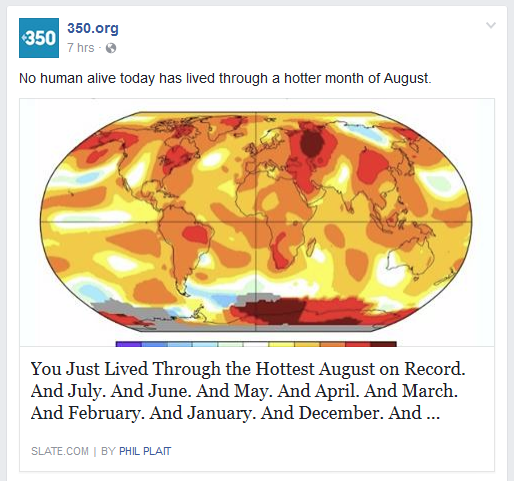File:NASA MODIS One week in April 2016.jpg
NASA_MODIS_One_week_in_April_2016.jpg (800 × 480 pixels, file size: 87 KB, MIME type: image/jpeg)
Hot 'n Hotter
July 2016
We just broke the record for hottest year, nine straight times
Earth’s record hottest 12 consecutive months were set in each month ending in September 2015 through May 2016
- This image released by NASA’s Earth Observatory Team from data collected by the Moderate Resolution Imaging Spectroradiometer (MODIS), an instrument on NASA’s Terra and Aqua satellites, shows the land surface temperature as observed by MODIS in Asia between April 15 to April 23, 2016. Yellow shows the warmest temperatures.
○
August 2016 Update
http://www.greenpolicy360.net/w/File:Hotimes.png
NASA: Earth is warming at a pace 'unprecedented in 1,000 years'
The planet is warming at a pace not experienced within the past 1,000 years, at least, making it “very unlikely” that the world will stay within a crucial temperature limit agreed by nations just last year, according to Nasa’s top climate scientist.
This year has already seen scorching heat around the world, with the average global temperature peaking at 1.38C above levels experienced in the 19th century, perilously close to the 1.5C limit agreed in the landmark Paris climate accord. July was the warmest month since modern record keeping began in 1880, with each month since October 2015 setting a new high mark for heat.
But Nasa said that records of temperature that go back far further, taken via analysis of ice cores and sediments, suggest that the warming of recent decades is out of step with any period over the past millennium.
“In the last 30 years we’ve really moved into exceptional territory,” Gavin Schmidt, director of Nasa’s Goddard Institute for Space Studies, said. “It’s unprecedented in 1,000 years. There’s no period that has the trend seen in the 20th century in terms of the inclination (of temperatures).”
“Maintaining temperatures below the 1.5C guardrail requires significant and very rapid cuts in carbon dioxide emissions or co-ordinated geo-engineering. That is very unlikely. We are not even yet making emissions cuts commensurate with keeping warming below 2C.”
File history
Click on a date/time to view the file as it appeared at that time.
| Date/Time | Thumbnail | Dimensions | User | Comment | |
|---|---|---|---|---|---|
| current | 18:07, 12 July 2016 |  | 800 × 480 (87 KB) | Siterunner (talk | contribs) |
You cannot overwrite this file.
File usage
The following 2 pages use this file:
- Atmospheric Science
- Bioneers
- Biosphere
- Citizen Science
- Climate Change
- Democratization of Space
- EOS eco Operating System
- Earth360
- EarthPOV
- Earth Observations
- Earth Science
- Ecology Studies
- Energy
- Environmental Laws
- Environmental Protection
- Environmental Security
- Environmental Security, National Security
- Global Security
- Global Warming
- Green Best Practices
- Green Graphics
- Green Networking
- Green Politics
- ISS
- NASA
- Networking
- New Space
- Overview Effect
- Planet Citizen
- PlanetLabs
- Planet Scientist
- Planet Citizens, Planet Scientists
- Renewable Energy
- Sea-Level Rise & Mitigation
- Solar Energy
- ThinBlueLayer
- US Environmental Protection Agency
- Whole Earth


